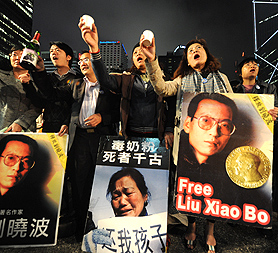Nobel Prize winner Xiaobo deserves his place in history
Growing up in China, Bessie Du was taught to share the joy of all Chinese winners in history – but how does this fit with China’s rejection of Nobel Prize winner Liu Xiaobo?

When I first heard that Liu Xiaobo won this year’s Nobel Peace Prize, I was genuinely proud.
We were taught in school that Nobel Prizes mean ultimate achievements and that we should share the joy of all Chinese winners in history.
It doesn’t matter if they hold foreign passports and have never lived in China – as long as they have dark hair and brown skins.
This time the winner is flesh and blood to many of us living in China.
‘Talented and eloquent’
Dr Liu Xiaobo became well known in the 80s as a literature critic; incredibly talented and eloquent.
The poems he wrote to his wife from his jail cell in the 90s were heart-warming. Even his political essays are beautifully written – sharp, crisp, with utter precision in choice of words.
What strikes me the most about him is his advocacy of justice and fairness through his writing. He is relentless towards social ills and abuse of power.
He is never afraid to speak his mind, even though he stutters when he talks.
He definitely deserves an award.
Empty chair for China's Nobel Prize winner Xiaobo
As China denounces the award of this year's Nobel Peace Prize to imprisoned writer Liu Xiaobo, Channel 4 News' Lindsey Hilsum meets demonstrators who claim Xiaobo is a traitor.
Read more: Empty chair for China's Nobel Prize winner Xiaobo
I must admit that I was surprised by the Chinese government’s reaction to Liu Xiaobo receiving the Nobel Peace Prize.
I expected some official statements reiterating that he’s broken the Chinese laws and is not free to collect the Prize.
I don’t have strong enough political sense to understand the West-conspiring-against-China theory and have excluded myself from that debate.
It is the Confucius Peace Prize awarded the day before the Nobel Peace Prize that really baffles me.
It’s meant to show the world the Chinese interpretation of human rights. But the award picked up by a little girl labelled “peace angel”
raises more questions than answers.
As I stood outside the residential compound where Liu Xia, Liu Xiaobo’s wife, lives in a virtual jail, and watched the plain-cloth police in dark sunglasses patrolling up and down the street, I asked myself: do we want our children to grow up afraid or do we encourage them to question those whose decision can make a difference in our lives?
Maybe the 2010 Nobel Peace Prize will enter a Chinese textbook one day, inspiring the young Chinese to speak up for justice and human rights.